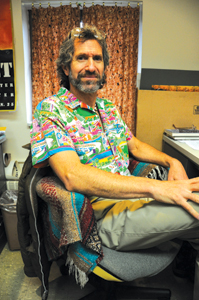
The “freshman 15” doesn’t just apply to first-year college students, according to a Binghamton University faculty member.
Alan Temes, a lecturer in the physical education academics department, said that the transition from home to school plays a part in the myth of the freshman 15.
“BU students are bright and intelligent, and because school challenges them academically … they have less time for physical activity,” Temes said.
According to Temes, the quality of the food students select while they are away from home also plays a role in subsequent weight gain.
“Students are going for what is quick, easy and tastes good, a combination of fast, low-quality food,” Temes said.
Temes said that a lack of awareness of what constitutes good food is part of the problem, especially when students snack on food that’s high in sugar or fat, such as chips.
Linda Spiro, a HealthCorps coordinator and BU alumna, said that she knows it’s difficult to make healthy food choices when you are in a rush.
“It’s important to be aware of nutritional facts and to prepare meals ahead of time,” Spiro said.
ALCOHOL’S IMPACT
However, another factor that could contribute to weight gain is an increased intake of alcohol by students.
“Alcohol has more calories than carbohydrates and protein,” Temes said.
According to Gerry Johansen, a counselor for the Alcohol and Other Drugs Program, alcohol is one of the leading causes of weight gain in people that do drink.
“Some college students can consume well over 1,000 calories per night in alcohol,” Spiro said. “This can lead to a pound of weight gain in a little over a three-day span of heavy drinking.”
Johansen said that 20 percent of students on campus might be heavy drinkers, 20 percent of students don’t drink at all and the remaining percentage consists of moderate drinkers.
The assumption that everyone drinks is not true, Johansen said.
“We allow our misperceptions to guide our choices; you don’t have to drink to fit in,” he added.
SNACK AND SLEEP HABITS
According to Temes, students who practice bad eating habits, such as skipping meals, can also experience weight gain.
Another bad eating habit is sitting in front of a television or computer while consuming food.
“People who sit in front of TVs aren’t even aware that they are eating; it becomes an automatic hand-to-mouth motion,” Temes said.
According to Temes, it’s best not to eat after 7 p.m.
“If you eat later in the evening, instead of using the calories, you will be wearing them,” Temes said.
It’s also important for students to remember to get their sleep. Temes said there is a direct correlation between lack of sleep and weight gain; the more hours you spend awake, the more time you have to eat.
Johansen said a lot of students gain weight at school because they do not keep the same sleeping patterns they had at home.
“It requires eight hours a day to metabolize what you take in,” Johansen said.
Adequate sleep is vital for both weight loss and muscle formation.
“When students come to college, some lose track of their biological rhythm,” Johansen said.
IMPACT OF STRESS
There is a variety of ways in which students can fight the impact of stress, which can lead to weight gain. Temes said he suggested stress management classes and activities designed to regulate anxiety, such as yoga and tai chi. Spiro also suggested getting plenty of exercise, even during the winter months.
“Walk instead of taking an elevator or park your car further away in a lot,” Spiro said.
Temes said that people need to go from “’human-doings’ to human beings.” This means that we should have more downtime instead of always being in a rush, he said.
“You should do things you enjoy to help relax you,” Temes said.
Justin Finkelman, an undeclared sophomore, said that he didn’t think that the “freshman 15” was prevalent on campus.
“From what I’ve seen, neither my friends nor I have experienced large gains in weight,” Finkelman said.
According to Temes, 66 percent of Americans are considered obese or overweight, and that percentage is rising. He said he believes we need to re-order our priorities to include our health.
“There is a push to succeed, but in the meantime our health is suffering,” Temes said. “If you lose your health, then everything else has relatively little value.”


